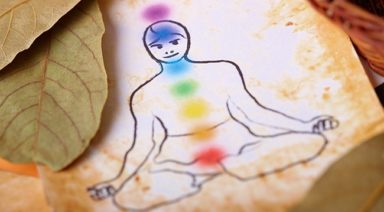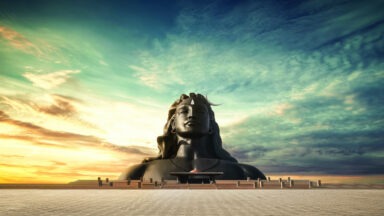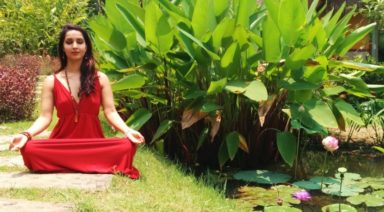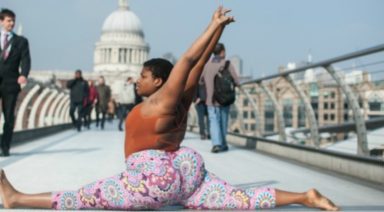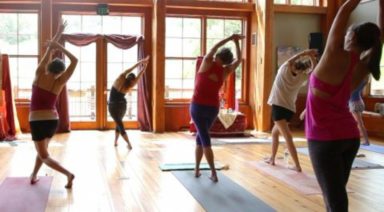Dinacharya: Your Daily Yogic Routine

Translating to “knowledge of life” in Sanskrit, Ayurveda is the 5,000 year old sister science of yoga that assists practitioners in leading their lives by way of intuitive rituals. In adhering to one’s specific needs, those utilizing the practice of Ayurveda fall into rhythm with the seasons of self, emulating Mother Nature’s transitions and revelations in spring, summer, fall, and winter.
The Ayurveda practice of dinacharya, or “law of nature,” consists of daily self-care routines, which provide structure for instilling balance and establishing cohesiveness in the physical, mental, and emotional bodies.
The Doshas
Dinacharya is based on the philosophy that human beings run on a biological clock dictated by the patterns of the sun and the moon; different times of day adhere to different types of energy. These energies, known as doshas, connect the body and the mind in functionality. Three doshas exist: vata, kapha, and pitta; each dosha is associated with elements found in nature.
Vata
The first and early waking hours of the day 2am to 6am, and their afternoon inverse 2pm to 6pm, are identified as vata, which is associated with the elements of air and ether, or a sense of lightness. Movement is incredibly important at these times, as they are both transitional periods. In the early hours of the morning, it is believed that sleep and dreams are most active and that we are most receptive to thought; in the afternoon, many experience the need to mobilize to reenergize, sparking creativity.
Kapha
From 6am to 10am and 6pm to 10pm, it is said our kapha energy governs the manner in which we show up in the world. Kapha works in relation with earth and water, countering vata’s airiness with a sense of grounding.
Pitta
Pitta energy runs its course through our systems during the hours of 10am to 2pm, and 10pm to 2am. Related to fire and water, waking pitta hours are correlated with high productivity. During the wee hours of the evening, typically the mind is resting, but the internal organs are vigorously cleansing the body, preparing us for the next day to come.
A Path to Balance
When the body and mind are in balance with these cycles, we experience a sense of contentment in all areas of our lives. As represented by the changes in even a matter of hours, the human condition is not static. It is not uncommon for one of the doshas to dominate at different points in time, regardless of where the dosha cycles suggest we should be landing on the energetic spectrum. We do not remain in a place of equanimity without putting forth awareness and effort, but it is possible to achieve balance through establishing a dinacharya routine.
Dinacharya practices help to establish congruence in our vata, kapha, and pitta energies.
When instability encroaches into our energetic cyclicality, we may feel noticeably “off” and over time, unbalanced physical, mental, and emotional bodies breed disease and dis-ease. Benefits of dinacharya can be experienced almost immediately, and can serve vitality for decades when adhered to properly.
Components of dinacharya can be incorporated into virtually any time of day, and can be quite extensive; according to Aryuvedic Physician Vasant Lad, there are nineteen steps composing a proper morning awakening of the physical and mental bodies alone. Many traditional dinacharya practices applicable to specific hours of the day can be adapted and become inputs to forming a consistent self-ritual.
Wake Before the Sun
This vata time of day is believed to be one of quiet connection. Once the sun is in the sky, the clock of Ayurveda ticks to kapha, signaling it is time to move and be productive. Waking earlier than you usually may begin the day offers a chance to connect energetically with self, rather than your inbox first thing.
Meditation
Because the morning boasts fresh energy and serenity, this segment of the day has the potential to serve as an undistracted platform for meditation. Perhaps your sit consists of a few quiet moments, or maybe lasts a bit longer. Returning to a mindfulness practice at the end of the day allows for you to come full circle with your day’s experience, and is effective in supporting more restful sleep.
Movement
Finding time to be active throughout the day is important for maintaining balance and focus, as well as setting the stage for fulfilling the day’s requirements with ample energy.
In the morning, support the waking of your body in a way you enjoy, whether it be taking a brisk walk around your neighborhood, working with kriya, hitting the mat for Pilates, or devoting time to your yoga practice to energize or unfold slowly.
The afternoon is a prime time to get the blood flowing. After your largest meal of the day is consumed at lunchtime, give yourself at least 10-15 minutes for a walk or afternoon stretch to promote blood flow, ensuring the body and mind stay fired and inspired. Evening calls for gentler movement, such as a yin yoga practice, so that sleep may be gracefully eased in to.
Oil Pulling
This practice has been an aspect of dinacharya for thousands of years, and involves swooshing oil, such as sunflower or sesame, around your gums and teeth for 15-20 minutes each day, typically in the morning. Oil pulling is effective in removing toxins and parasites, which reside in the nooks and crannies between teeth, around the tongue, and in the gums.
These organisms not only affect the outer appearance of our pearly whites, but are often the root of inflammation and infection occurring throughout the body.
To reap the benefits of a brighter smile, clearer sinuses and skin, and healthier immune system, simply drink a glass of water upon waking, melt 1-3 tablespoons of an oil of your choice either on the stove or in your mouth, gargle for 20 minutes (this can be done while preparing breakfast or lunch, reading emails, etc.), spit, and rinse with water.
Self-Massage
Known as Abhyanga in Ayurveda, self-massaging is often practiced as a component of dinacharya in either or both the morning and the evening. According to Sandhiya Ramaswamy, regarded Ayurvedic chef and educator, abhyanga, when performed daily, enhances balance in the energy bodies and overall longevity, calms the nervous system, softens skin, and tones muscle, amongst other benefits. Using warm oil, start at your scalp and work your way down the body using your fingertips and palms. Once applied, allow for the oil to marinate into your skin for five to ten minutes, and follow with a warm bath or shower.
Skin Brushing
This Ayurvedic technique requires a very small time investment, but pays greatly in its dividends. Using silk gloves or a dry skin brush, start at the feet and work your way up to the crown of your head. According to Dr. John Doulliard, director of LifeSpa.com, a leading resource in Ayurvedic wellness, brushing toward the direction of your heart drains the lymphatic system, and can help the body move waste more quickly and stimulate the burning of fat. This technique can be practiced preceding self-massage for added benefit.
Nourish Properly
Morning and evening meals should be light in comparison to your lunchtime consumption. Afternoon is the time of day most appropriate for intake of your heaviest meal, for several reasons. The digestive system has fully awakened, and the body has ample time to break down what has been consumed without interrupting your awakening or your sleep cycle. Agni, or digestive energy, is in full force; in order to keep the fire roaring, it is necessary to fuel adequately.
According to Monica Bloom, author of “In Your Elements: A Blooming Ayurvedic Guide to Creating Your Best Life,” a warm, vegetable-filled plate should be consumed at this time. Acknowledging this may not be ideal for meals eaten at work in terms of preparation, Monica suggests preparing a large batch of healthful dishes at night, eating a small portion for dinner, and bringing the majority on the go with you the next day to save both time and hunger pangs.
Head to Bed Early
It is recommended to begin your evening ritual around 8:30pm to ensure a restful transition into your evening rest. Unwinding with a book or a bath serves as a palate cleanser between the busyness of the day and the tranquility of bedtime. Establishing an early bedtime initiative for your self can also prevent late-night, metabolism-hindering snacking; around 10pm, pitta energy kicks back in which, when awake can spark hunger, when resting allows for full-body restoration.
The above are only a select few options on the full menu of dinacharya offerings. Taste one, taste all offerings; Director of Ayurveda Programs at Shankara Ayurveda Spa Medha Garud notes that the adoption of two dinacharya-inspired changes can make a difference when enveloped into your day-to-day routine. The implementation of a personal dinacharya ritual can serve as powerful and effective insurance for physical, mental, and emotional congruence and observance.
How Your Emotional State Relates to the Ayurvedic Doshas

Ayurveda is the science of life. It is a holistic form of wellness that uses natural, earth-based wisdom to promote individual balance and health. Ayurveda teaches that there are three universal intelligences at work in the macrocosm of the universe and in the microcosm of our bodies. These intelligences are called the doshas. The doshas are made up of a combination of the five great elements: earth, water, fire, air, and ether. These five elements tend to group together into pairs that create the doshas: Vata, Pitta, and Kapha.
Vata
Vata is likened to the combination of air and ether; it is light, dry, cold, and changeable. It rules everything in the body and the universe that has to do with movement, transportation, and communication. Our speech, for example, is ruled by Vata dosha as is the motion of our intestines during peristalsis.
Pitta
Pitta is the combination of the fire element with a bit of moisture. It is the intelligence that governs everything that transforms, digests, and metabolizes. It governs all that transforms in our bodies; the enzymatic action of the stomach, the power of our sight, and our metabolism are some of the areas of the body ruled by Pitta dosha.
Kapha
Kapha dosha is likened to earth and water. It is heavy, cool, and stable. It rules our immunity, our strength, and our stability. Kapha dosha also rules the watery places in the body, the lining of the stomach, and the inside of the mouth, as well as our overall strength and immune system.




